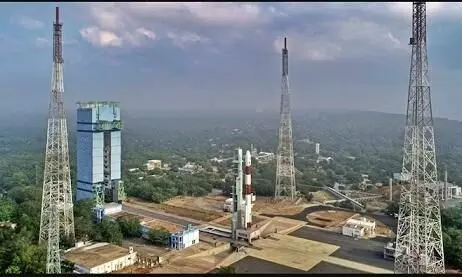
ISRO's new satellite to study black holes; a 1st for India
text_fieldsSriharikota: ISRO is ready to launch its first X-Ray Polarimeter Satellite, to study celestial objects like black holes. The satellite will be carried to orbit by a Polar Satellite Launch Vehicle rocket scheduled to be launched on Monday, PTI reported.
The launch comes after the success of its Gaganyaan Test Vehicle D1 mission in October.
The PSLV-C58 rocket, in its 60th mission, would carry primary payload XPoSat and 10 other satellites to be deployed in low earth orbits.
The 25-hour countdown commenced on Sunday for the lift-off scheduled at 9.10 am from the first launch pad at this spaceport, located about 135 km east of Chennai, on January 1.
“The countdown commenced for PSLV-C58 at 8.10 am today,” ISRO sources said.
The X-ray Polarimeter Satellite (XPoSat) is aimed to investigate the polarisation of intense X-ray sources in space.
According to ISRO, it is the first scientific satellite dedicated to carrying out research in space-based polarisation measurements of X-ray emission from celestial sources.
Besides ISRO, the US-based National Aeronautics Space Agency (NASA) conducted a similar study -- the Imaging X-Ray Polarimetry Explorer mission in December 2021 on the remnants of supernova explosions, the particle streams emitted by black holes and other cosmic events.
While space-based X-ray astronomy has been established in India focusing on imaging, and time domain studies, Monday's mission marks a major value-addition to the scientific fraternity, the space agency said.
The objective of the PSLV-C58 mission includes measuring polarisation of X-rays in the energy band 8-30 keV emanating from about 50 potential cosmic sources, to carry out long term spectral and temporal studies of cosmic x-ray sources.
The X-ray polarisation serves as a crucial diagnostic tool for examining the radiation mechanism and geometry of celestial sources.
The primary payload of XPoSat is POLIX (Polarimeter Instrument in X-Rays), which is designed to measure polarimetry parameters by Raman Research Institute, and XSPECT (X-ray Spectroscopy and Timing) built by the U R Rao Satellite Centre, Bengaluru. The Mission life is about 5 years.
The space-based study of X-ray polarisation is gaining utmost importance internationally, and in this context, the XPoSat mission would play a significant role, ISRO added.
XPoSat is anticipated to bring substantial benefits to the Astronomy community globally. Apart from its capability of timing and spectroscopy-based observations, the insights derived from X-ray polarisation measurements on celestial objects like black holes, neutron stars, and active galactic nuclei, hold the potential to significantly improve the understanding of their physics.
The mission is poised to play a pivotal role in building expertise in X-ray polarimetry in India, providing a foundation for future advancements and fostering a collaborative network within the astronomy community.
The 44.4-meter-tall PSLV rocket would first deploy the primary satellite into a 650 km Low Earth Orbit around 21 minutes after lift-off and later the scientists would bring the satellite to a lower altitude of about 350 km by restarting the fourth stage of the vehicle, for conducting the PSLV Orbital Experimental Module-3 (POEM-3) experiment.
It may be recalled that the space agency conducted a similar scientific experiment using POEM-2 in the PSLV-C55 mission in April 2023.
The rocket that will fly is the PSLV-DL variant which has a lift-off mass of 260 tonnes. The fourth stage is configured as a 3-axis stabilized Orbital platform for conducting experiments.
The payloads are a Radiation Shielding Experiment Module by TakeMe2Space, Women Engineered Satellite by LBS Institute of Technology for Women, BeliefSat (an amateur radio satellite) built by K J Somaiya Institute of Technology, Green Impulse Transmitter by Inspecity Space Labs Pvt Ltd, LEATTD -- Launching Expeditions for Aspiring Technologies Technology Demonstrator by Dhruva Space Pvt Ltd, RUDRA 0.3HPGP and ARKA 200 developed by Bellatrix Aerospace Pvt Ltd, Dust Experiment (DEX) built by PRL, ISRO and Fuel Cell Power System and Si-based High Energy cell built by Vikram Sarabhai Space Centre.























